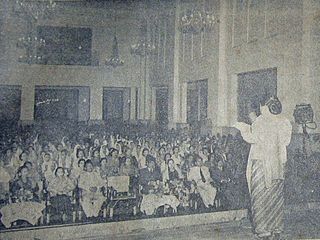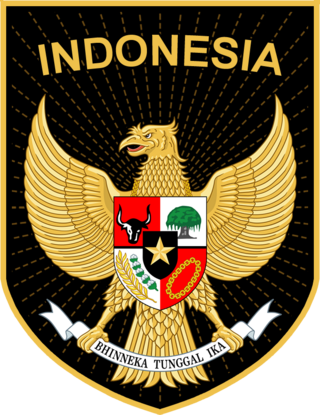Related Research Articles

Gerwani was a women's organization founded as Gerwis in Semarang, Central Java, on 4 June 1950.
Gerakan Wanita Sosialis was a women's organization in Indonesia. It was the women's wing of the Socialist Party of Indonesia (PSI). Before the founding of GWS, PSI had relied on close political contacts with another women's organization, Isteri-Sedar. But after the 1955 elections, the PSI felt that Isteri-Sedar had failed to mobilize women voters for the party and thus the party decided to form a women's wing of its own (GWS). GWS membership was open to women 16 years old and above. As of 1960, GWS had 115 branches.
Isteri-Sedar was a women's organization established in Bandung, Indonesia in 1930 by Soewarni Pringgodigdo. It was a radical nationalist group founded on its anti-polygamy stance after the First Indonesian Women's Congress in 1928.

The National People's Party, initially founded as the Indonesian National Party–Independent, was a political party in Indonesia. It was founded on 23 July 1950 after a split within the Indonesian National Party (PNI). The divisions with the PNI had appeared at the party congress in May the same year, when Sidik Djojosukarto's followers had emerged victorious. Djody Gondokusumo was the chairman of the party.
The Murba Women's Union, abbreviated Perwamu, was an Indonesian women's organization. Perwamu was founded on September 17, 1950. It was politically linked to the leftwing nationalist Murba Party. The organization undertook social, economic and educational activities. The organizational structure of Perwamu was based on democratic centralism. Perwamu disappeared after the 1965 coup d'état.

The Indonesia women's national football team represents Indonesia in international women's football, and is controlled by the Football Association of Indonesia (PSSI). Despite football being one of the nation's favorite sports, Indonesia is not among the strongest teams in the AFC, especially its women's side. Indonesia has no tradition for women's football and considerably underdeveloped, in contrast with the men's side.

Martha Christina Tiahahu was a Moluccan freedom fighter and National Heroine of Indonesia.
Maria Ulfah Soebadio Sastrosatomo, better known by her first married name Maria Ulfah Santoso, was an Indonesian politician and women's rights activist who served as Minister of Social Affairs under Prime Minister Sutan Sjahrir. She was the first Indonesian woman to receive a degree in law as well as the first female Indonesian cabinet member. Santoso, the daughter of a politician, became interested in women's rights after seeing numerous injustices in her youth. Despite pressure to become a doctor, she graduated with a degree in law from Leiden University in 1933; while in the Netherlands she also became involved in the Indonesian nationalist movement.

Wanita dan Satria is a 1941 film from the Dutch East Indies directed by Rd Ariffien and produced by Ang Hock Liem for Union Films that is probably lost. Starring Djoewariah, Ratna Djoewita, Hidajat, Z. Algadrie, and Moesa, it follows a womaniser named Soedrajat who abuses his status to gain women's trust before ultimately getting his comeuppance. Reviews were mostly positive, with one praising the film's depiction of women's issues in a Muslim society.

The Indonesia women's national futsal team represents Indonesia in international women's futsal competitions. While under the ultimate control of Indonesia's football governing body, PSSI, the one who regulates the activities of the women's national futsal team is the Indonesia Futsal Federation—futsal governing body of Indonesia and a member association of PSSI.

Bridget Lew Tan was a Singaporean migrant workers' rights advocate and the founder of the Humanitarian Organization for Migration Economics (HOME). After retiring from a career in the private sector, Tan began volunteering with the Archdiocesan Commission for the Pastoral Care of Migrants and Itinerant People (ACMI), which she chaired. She left ACMI after it declined to support some of Tan's initiatives, and in 2004 she founded HOME, which provides services for and advocates on behalf of migrant workers. That same year she founded a sister organization in Indonesia, Yayasan Dunia Viva Wanita. For her work, Tan was honored by the Asia Society, the United States Department of State, and the governments of Thailand and the Philippines.
Indonesian Women's Professional Futsal League is the main competition futsal for women at the national level and is in Indonesia, organized by the Indonesian Futsal Federation (FFI). This competition began in the 2012–2013 season and until now it has been arranged 6 times. This competition was held in conjunction with the title of the Indonesia Pro Futsal League.

Feminism in Indonesia refers to the long history of discourse for gender equality to bring about positive social change in Indonesia. The issues women in Indonesia currently are facing include gender violence, underage marriages, and lack of representation in the political system. Feminism and the women's right movement began during colonial Indonesia under Dutch rule and were spearheaded by the national heroine Kartini, a Javanese noblewoman who advocated for the education of all women and girls regardless of social status. In the early 19th century, women's rights organizations and movements were allowed to developed under Budi Utomo, the first Indonesian Nationalist organization. Modern day Indonesian feminism include and are influenced by both fundamentalist and progressive Islamic women's organizations.

The Indonesian Women's Congress, often known by its Indonesian acronym Kowani, is a federation of Indonesian women's organizations which was founded in 1946. Its headquarters are located in Jakarta. The name also refers to national congresses which have taken place regularly since 1928. Since its founding the Congress has included women from various political and religious backgrounds; it has generally allowed independence and autonomy for its member organizations.

Nani Soewondo-Soerasno was an Indonesian lawyer, suffragist, and women's rights activist.

Njonja Tjoa Hin Hoei, who was born Kwee Yat Nio and was also known by the Buddhist name Visakha Gunadharma, was a Chinese Indonesian journalist, writer, Buddhist figure, and political activist during the late colonial and early independence periods. She was especially known for being publisher and editor of a women's magazine Maandblad Istri which ran from the 1930s to the early 1950s.
On 25 October 2022, at around 7:00 am Western Indonesia Time (UTC+7), an attempted shooting occurred in front of the Istana Negara in Jakarta, Indonesia. A female assailant trespassed the Istana Negara security layer and attempted to shoot the President and/or Presidential Guard using an FN HP-DA Pistol. President of Indonesia Joko Widodo was not in the Istana Negara at the time of attack as he was visiting East Kalimantan and Nusantara. The assailant was apprehended immediately by the Presidential Guard (Paspampres) and Indonesian National Police on the scene and is currently detained at Metro Jaya Region Police HQ.
International Women University or IWU is the first women's university in Indonesia. It is located in Bandung, the capital city of West Java. It is a private university, under supervision of Arena Komunikasi Bandung Foundation.
Women's Football Association of Indonesia is the governing body for women's association football in Indonesia. Since 2017, this organization has been recognized as member of the Football Association of Indonesia (PSSI).

Umi Sardjono was a prominent Indonesian activist who fought for the independence of the country and supported women's rights. She was involved in the anti-fascist and anti-war movements from the 1940s to the 1960s. As a resistance fighter during the Japanese occupation of the Dutch East Indies, she and her husband operated a food stall which served as a message center for the underground. Captured in 1944, the couple were imprisoned until the surrender of Japan. On gaining release, they worked in the independence movement hoping to free Indonesia from Dutch rule.
References
- 1 2 Martyn, Elizabeth. The women's movement in post-colonial Indonesia: gender and nation in a new democracy . London [u.a.]: RoutledgeCurzon, 2005. pp. 218-219